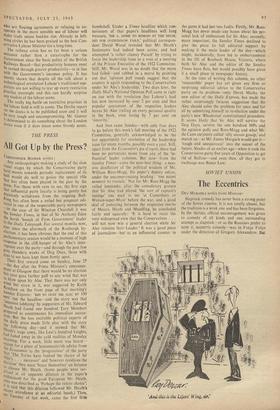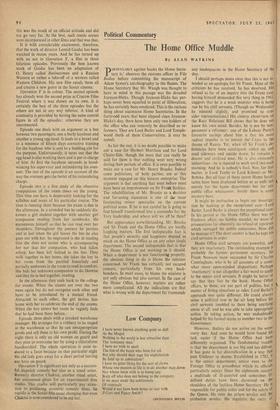SOVIET UNION
The Eccentrics
DEV MURARKA writes from Moscow: Slapstick comedy has never been a strong point of the Soviet cinema. It is not totally absent, but the tradition is a weak one and has been forgotten. In the thirties, official encouragement was given to comedy of all kinds and one outstanding attempt at slapstick—or as the Russians prefer to term it, eccentric comedy—was in Volga Volga under the direction of Gregory Alexandrov. But
this was the result of an official attitude and did not go very far. At the best, such comic scenes were incorporated in other films and that was that.
It is with considerable excitement, therefore, that the work of director Leonid Gaidai has been watched in recent years. And he has turned up
with an ace in Operation Y, a film in three hilarious episodes. Previously the best known work of Gaidai has been an adaptation of 0. Henry called Businessman and a Russian Western or rather a take-off of a western called Western Children. His new film excels them all and creates a new genre in the Soviet cinema.
Operation Y is in colour. The second episode has already won the second prize at Cracow Film Festival where it was shown on its own. It is certainly the best of the three episodes but the others are not in any way inferior. A kind of continuity is provided by having the same central figure in all the episodes: otherwise they are unconnected.
Episode one deals with an argument in a bus between two passengers, one a burly layabout and another a young egg-head. It leads to a brawl and to a sentence of fifteen days corrective training for the layabout who is sent to a building site for the purpose. Unfortunately, it turns out that the egg-head is also working there and is put in charge of him. At first the layabout succeeds in hood- winking his supervisor and intimidating his over- seer. The rest of the episode is an account of the way the overseer gets the better of his intimidating charge.
Episode two is a fine study of the obsessive compulsions of the exam times on the young. This time our hero is desperately looking for the syllabus and notes of his particular course. The time is running short because the exam is due in the afternoon. In a crowded bus he suddenly dis- covers a girl student together with another girl companion reading from her notebooks. He manoeuvres himself so that he can read over her shoulders. Throughout the journey he persists and at last when the girl leaves the bus he also goes out with her. So engrossed is she in reading that she does not notice who is accompanying her nor that her companion, who had fallen asleep, has been left behind in the bus. They walk together to her home, she takes the key to her room from the puzzled houselady and partially undresses in the room to read in comfort. She bids her unknown companion to do likewise and they lie in bed together, reading.
In the afternoon they rush back to the college for exams. When the exams are over the two meet again but do not recognise each other and have to be introduced by a mutual friend. Attracted to each other, the girl invites him home with her to celebrate the end of the exams. When the boy enters her room he vaguely feels that he had been there before.
Episode three deals with a crooked warehouse manager. He arranges for a robbery to be staged in the warehouse so that he can misappropriate goods and sell them to his own profit. During the night there is only an old woman on guard and they plan to overcome her by using a chloroform handkerchief. The whole operation is soon re- duced to a farce because on that particular night the old lady goes away for a short period leaving our hero on guard.
Operation Y is significant not only as a success- ful slapstick comedy but also as a trend setter. Recently director Chukrai, another trend setter, has announced plans for an experimental film studio. This studio will particularly pay atten- tion to producing eccentric comedy films. So rapidly is the Soviet film scene changing that even Chukrai is now considered to be old hat.















































 Previous page
Previous page